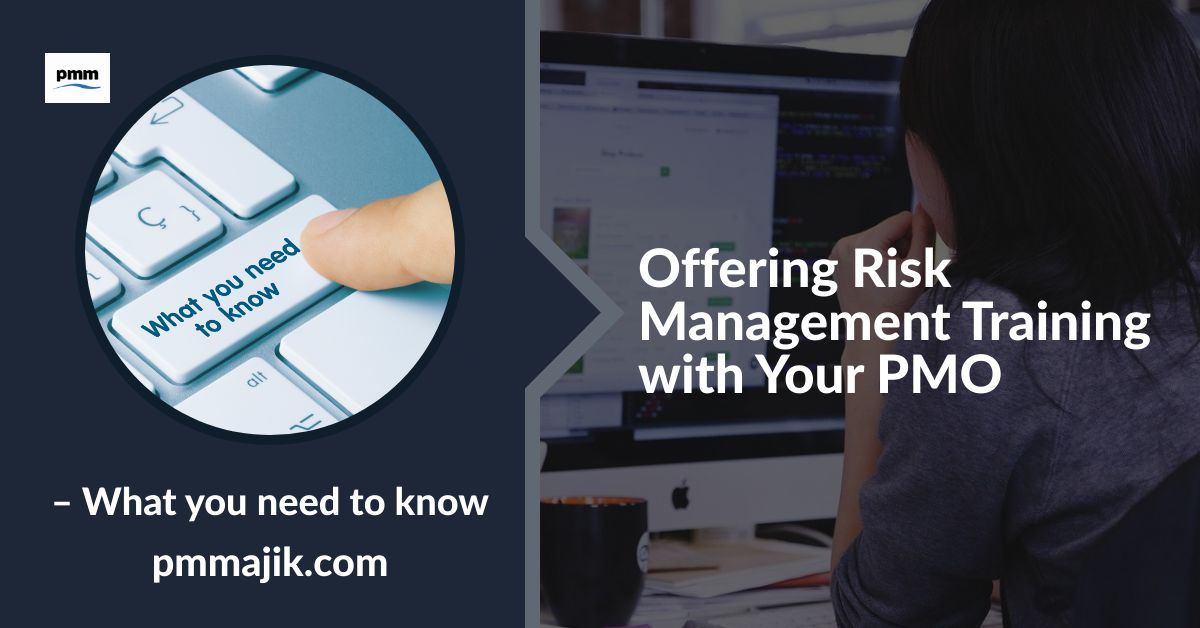Risk is a part of project management as much as it is life. Offering risk management training with your project management office (PMO) will keep risks manageable and understood across your projects and their managers.
The list of risks a project faces is long – we’ll briefly look at them in a moment. You need to know the project managers (PMs) working on your projects are capable of assessing and managing risk to protect their KPIs and the PMO’s overall success.
Don’t leave it up to chance that your PMs know how to deal with risk. Your office likely has templates for risk assessments, but you need to teach those using them, so you get the best out of them. To be sure it’s not another form filling exercise, we’re going to cover:
- The risks you need your PMs to be aware of
- Which tasks and skills your training package should focus on
- How to present the training material for your PMs
What does a project manager need to know about risk?
Each project will have risks involved. Money and effort is being spent that’s aiming to get an end result, but it’s not guaranteed. Being able to understand and assess the risks in a project, and use that to inform decision-making, is imperative.
Some of the risks that a project manager needs to analyse before and during a project are:
- Scope creep – can a project take a wider scope?
- Costs – can spending more get a better ROI?
- Time – will pushing a project quicker get stronger results?
- Technology – can rolling out new tech achieve faster delivery?
- People – what’s the cost of foregoing people retention activities?
- Comms – will the communication plan get the message across?
- Procurement – is the cheaper supplier as reliable?
What should project risk assessment training include?
There are three main areas where your PMs will need to learn, develop, and maintain their skills.
1. Using templates and matrices
Each PMO will have different processes to complete a risk assessment, although the outcomes will look the same. Although intuitive to the person who designed the risk assessment template, how to use it may not be so obvious to everyone else.
As well as the mechanics of using the template, there will be skills such as data gathering and, how to navigate systems to gather that data. Your PMs might be amazing at getting their team to deliver their sprint goals but not so great at diving into data to find what your template needs.
2. Presenting risk assessment
Not every PMO will require this step as part of a risk assessment. Yet, if a PM is trying to change their project and convince your PMO or the sponsoring executive to support their amendment, they should be able to use their risk assessment for that.
You want your PMs to be capable of writing reports based off of data and using accurate analysis of the data. For example, a manager wants to bring in a freelance programmer part way through a project? They have to be able to look at the risk and rewards and present that to the decision-maker. Data visualisation and infographics skills will also help here.
3. Communicating rationale for risks
When a risky decision is made, the rationale needs to be clearly communicated to everyone affected. Project team members may be apprehensive about adopting a new workflow management software or be wary of changing suppliers for a project.
It’s up to PMs to communicate that risk to their teams. This requires a thorough understanding of what information went into the decision and the potential outcomes. Getting this message right should mitigate long term risks.
What’s the best way to train risk management?
Risk management in projects is a big topic. The fundamentals of risk management may not fall under the purview of your PMO, but if they do, then having a course that uses a blend of classroom and online training will make the training repeatable – every PM will need the training at some point.
In terms of the skills related to risk assessment:
- Template and matrix training can be delivered as online video and hands-on practice and assessment with face-to-face Q&A sessions when needed.
- Presenting skills delivered as online modules on an LMS are effective.
- Communication skills trained through off-site sessions and peer learning can give practice to leaders.
The take-home
Offering risk management training through your PMO should be skills-based rather than theory. The theory training will come from elsewhere. A mix of online, peer, and off-site training will embed the skills required within your PMs.






